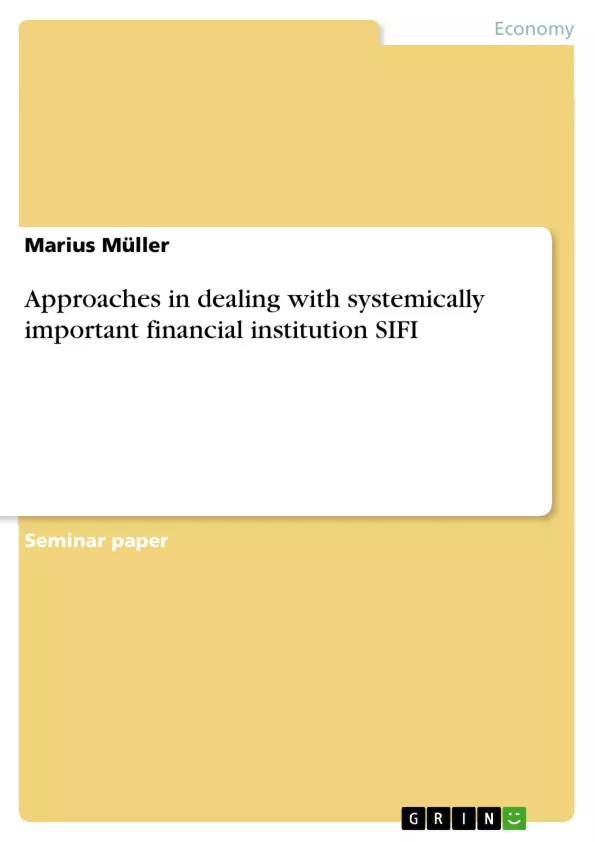As a result of the worldwide financial crisis which occurred in 2007, an intensive discussion about preventing possible future crisis like that has arisen. One of the key points in these debates is the necessity to protect the economy from negative effects of failing financial institutions.
These can be dramatic what you can see by reflecting the facts of the recent crisis that is characterized by big bank failures and so caused domino effects. Thus it is very important to reduce the so called systemic relevance of financial institutions. But the design of a framework that contains systemic risk effectively is not just a simple task, because you have to consider a couple of factors in view of creating an effective solution.
This paper presents a short overview of the issue of hazard that is caused by systemic relevant institutions (SIFI) and the content of the actual debate by illustrating the costs the institutions cause and the presentation and evaluation of several approaches of economic experts with regard to the topic of reducing systemic relevance. Finally the paper tries to draw a conclusion.
Inhaltsverzeichnis (Table of Contents)
- I. Introduction
- II. Facing systemic relevance
- II.1 Defining systemic relevance
- II.2 Defining the leading actors
- II.3 Benefits of being systemic relevant
- III. Design of an efficient framework to contain systemic risk
- III.1 Elements of an efficient framework
- III.2 Basel III - A step into the right direction?
- III.3 Proposals to reduce the TSTF problem
- III.3.1 Quantity reduction based approaches
- III.3.2 Prize regulation based approaches
- IV Conclusion
- V. Appendix
- VI. References
Zielsetzung und Themenschwerpunkte (Objectives and Key Themes)
This paper examines the issue of systemic relevance in financial institutions, specifically focusing on how to effectively mitigate the risks posed by such institutions. It explores the concept of "too big to fail," analyzes the factors contributing to systemic relevance, and evaluates various approaches proposed by economists to address the problem.- Defining and understanding the concept of systemic relevance.
- Identifying the key actors and institutions that exhibit systemic relevance.
- Analyzing the incentives and benefits for institutions to become "too systemic to fail."
- Evaluating different approaches to reducing systemic risk and mitigating the "too big to fail" problem.
- Drawing conclusions regarding the most effective methods for managing systemic risk in the financial system.
Zusammenfassung der Kapitel (Chapter Summaries)
- I. Introduction: This introductory chapter sets the stage by outlining the importance of preventing future financial crises, particularly those stemming from the failure of systemic financial institutions. It highlights the detrimental effects of such failures and emphasizes the need to reduce the systemic relevance of financial institutions. The chapter also introduces the key objective of the paper, which is to provide an overview of the issue, explore current debates, and present various approaches to mitigate systemic risk.
- II. Facing Systemic Relevance: This chapter delves into the core concept of systemic relevance. It defines the term "too big to fail" and explores the complexities of managing the potential fallout from the failure of a systemic institution. The chapter also investigates the incentives and motivations behind institutions' drive to become "too systemic to fail." This involves understanding the benefits, advantages, and potential risks associated with systemic relevance.
- III. Design of an Efficient Framework to Contain Systemic Risk: This chapter focuses on the development of effective frameworks to manage and mitigate systemic risk. It examines the essential elements of such frameworks, exploring key considerations for achieving a robust and balanced system. The chapter also evaluates the effectiveness of Basel III, a widely recognized set of international regulatory standards, in addressing systemic risk. Furthermore, it investigates various proposals aimed at reducing the "too systemic to fail" problem, focusing on both quantity reduction approaches and price regulation approaches.
Schlüsselwörter (Keywords)
This paper focuses on the critical issue of systemic relevance in financial institutions. Key terms and concepts include "systemic risk," "too big to fail," "systemically important financial institutions (SIFI)," "Basel III," "TSTF problem," "quantity reduction approaches," and "price regulation approaches." The paper explores the motivations and incentives driving institutions toward systemic relevance, analyzes various proposed frameworks for mitigating systemic risk, and ultimately aims to contribute to the ongoing discussion on effective strategies for managing systemic risk in the financial system.Frequently Asked Questions
What is a Systemically Important Financial Institution (SIFI)?
A SIFI is a financial institution whose failure could trigger a financial crisis and have a dramatic negative impact on the overall economy due to its size, complexity, and interconnectedness.
What does the term "Too Big to Fail" (TBTF) mean?
It refers to the idea that certain corporations are so large and important to the economy that a government will provide financial assistance to prevent them from failing.
How does Basel III address systemic risk?
Basel III introduces international regulatory standards on bank capital adequacy, stress testing, and market liquidity risk to strengthen the resilience of the banking sector.
What are quantity reduction approaches in banking regulation?
These are proposals aimed at limiting the size or scope of financial institutions to reduce their systemic relevance and the potential impact of their failure.
Why do institutions have incentives to become systemically relevant?
Being "too systemic to fail" can provide benefits such as lower borrowing costs, as creditors expect a government bailout in case of trouble, creating a moral hazard.
- Quote paper
- Diplom Volkswirt Marius Müller (Author), 2011, Approaches in dealing with systemically important financial institution SIFI, Munich, GRIN Verlag, https://www.hausarbeiten.de/document/198269


